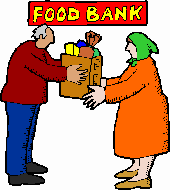Recycling Spoiled Produce from the
Hartford Regional Produce Terminal and Market
|
Grant Recipient |
Foodshare |
|
|---|---|---|
|
Total Grant Funds (provided by DEP) |
$47,881 |
|
|
Total Matching Funds |
$54,180 |
|
|
Start-Date |
October 2002 |
|
| Final Report | August 14, 2008 Final Report |
|
|
Contact |
Steve Slipchinsky, Regional Market Project Supervisor, Foodshare 860-286-9999 ext.134 or sslipchinsky@foodshare.org |
August 2002 Update | December 2002 Update | July 2003 Update
Introduction
Bringing fresh produce to hungry people before it spoils is a challenge to Foodshare’s partner agencies. Foodshare addresses the coexisting issues of wasted food and lack of fresh produce by arranging for surplus fruits and vegetables produced by local growers to be donated to partner agencies feeding those at risk of hunger. Foodshare also arranges for wholesalers at Hartford’s Regional Produce Market to make their surplus fruits and vegetables available for donation. In March of 1999, Foodshare hired a fulltime Agricultural Marketing Coordinator to maintain and expand relationships with local farmers and wholesalers at the Regional Market. Hiring the coordinator accounts for the biggest increase in produce donations in Foodshare’s history. Donations increased from 397 tons in 1999 to 850 tons in 2001. Increases are expected to continue as a result of this successful relationship.
The nature of fresh produce brings with it the issue of spoilage. Before this pilot began, organic waste is not being recycled at Foodshare’s warehouse in Windsor, or at the Regional Market in Hartford. All organic waste was disposed with municipal solid waste in dumpsters. The dumpsters emitted foul odors, leaked rotten juice, and attracted insects and vermin which cause health concerns. The disposal costs incurred by Foodshare and the Regional Market were also problematic. Both parties saw the need for a sustainable and efficient method to deal with these issues in a way that proposes to be beneficial to Foodshare and the Regional Market.
Project Summary
As this pilot is implemented, Foodshare will be moving its agricultural division from Windsor to the Regional Market in Hartford. This move alone is expected to result in less spoilage and more useable food, as it will be more convenient and timely for wholesalers to donate produce before it goes bad. Fruit and vegetables that do spoil will be processed through an Organic Resource Recovery System (ORRS). The ORRS is a hammer mill that pulverizes the produce into a slurry (liquefied vegetable waste), and discharges it into a holding tank for storage. Periodically, the slurry will be collected using vacuum trucks and transported to permitted organic waste recycling facilities. Wholesale vendors at the Regional Market will pay for their own recycling through the ORRS on a weight/volume based system, or Pay-As-You-Throw. In other words, the more they throw out, the more they will pay. Therefore, it will be in the best interest for the vendors to move surplus produce to Foodshare before it has a chance to spoil…a win-win situation for both parties, and the environment. It is estimated that 1,150 tons/year or about 3 tons/day of spoiled produce will be diverted to recycling through this pilot project.
Benefits
The benefits of this pilot include:
- Increased donation of food to the hungry
- Elimination of odors and health concerns from leachate around trash compactors and open bin storage of food waste
- Reduction of wet, high-nitrogen waste being sent for disposal and therefore reduction of air emissions and ash disposal from resource recovery plants
- Increase in local and state recycling rate
- Cost effectiveness offered by volume reduction and bulk density, more efficient use of dumpsters/compactors, and weight/volume based billing
- Extension of trash compactor life by reducing acidic liquid waste that accelerates corrosion of metal
- Reduced space requirement as compared to other food waste collection systems
- Establishment of a model organics recycling system for other commercial and institutional establishments to explore and possibly implement
- Supports the goals of the proposed statewide Solid Waste Management Plan
Composting | Organics Recycling Pilot Projects
Content Last Updated on February 13, 2020


